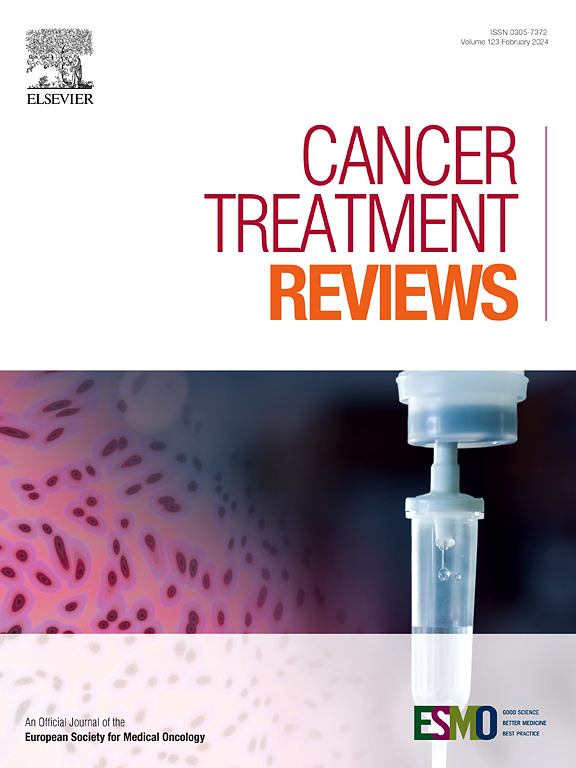加强三阴性乳腺癌的放疗技术
IF 9.6
1区 医学
Q1 ONCOLOGY
引用次数: 0
摘要
乳腺癌是全世界妇女中最普遍的癌症,有各种亚型,需要不同的治疗方法。其中,三阴性乳腺平衡癌(TNBC)被认为是最具侵袭性的形式,由于缺乏针对性的治疗选择,通常与预后不良相关。这篇综述特别关注放射治疗(RT)作为TNBC的一种治疗方式,评估最近的进展和正在面临的挑战,特别是放射耐药问题。放疗仍然是乳腺癌治疗的重要组成部分,包括TNBC。多年来,已经进行了多项改进,以提高RT的有效性并最大限度地减少耐药性。立体定向放射治疗(SBRT)和立体定向放射外科(SRS)等先进技术的引入,大大提高了精度和降低了毒性。最近,质子放射治疗,一种新的放射治疗方式,提供了增强剂量分布和减少对周围健康组织的损伤。尽管有这些技术进步,但一部分TNBC患者仍然表现出对RT的耐药性,导致复发和治疗效果不佳。为了克服放射耐药,人们越来越关注将放射治疗与靶向治疗药物相结合,使癌细胞对放射敏感。放射增敏药物已被探索,通过使癌细胞更容易受到辐射引起的损伤来增强放射治疗的疗效。潜在的候选药物包括DNA损伤修复抑制剂、免疫检查点抑制剂和干扰TNBC细胞关键存活途径的小分子靶向治疗。总之,虽然放疗仍然是TNBC治疗的关键方式,但放射耐药仍然是一个重大挑战。未来的研究应着眼于优化放疗技术,同时结合放射增敏剂提高治疗效果。通过将放疗与靶向药物治疗相结合,可以开发出更有效和个性化的治疗方法,最终改善患者预后并降低TNBC的复发率。本文章由计算机程序翻译,如有差异,请以英文原文为准。

Enhancing radiotherapy techniques for Triple-Negative breast cancer treatment
Breast cancer is the most prevalent cancer among women worldwide, with various subtypes that require distinct treatment approaches. Among these, Triple-Negative Breast Bancer (TNBC) is recognized as the most aggressive form, often associated with poor prognosis due to its lack of targeted therapeutic options. This review specifically focuses on Radiotherapy (RT) as a treatment modality for TNBC, evaluating recent advancements and ongoing challenges, particularly the issue of radioresistance.
RT remains an essential part in the management of breast cancer, including TNBC. Over the years, multiple improvements have been made to enhance RT effectiveness and minimize resistance. The introduction of advanced techniques such as Stereotactic Body Radiation Therapy (SBRT) and Stereotactic Radiosurgery (SRS) has significantly improved precision and reduced toxicity. More recently, proton radiation therapy, a novel RT modality, has been introduced, offering enhanced dose distribution and reducing damage to surrounding healthy tissues. Despite these technological advancements, a subset of TNBC patients continues to exhibit resistance to RT, leading to recurrence and poor treatment outcomes.
To overcome radioresistance, there is an increasing interest in combining RT with targeted therapeutic agents that sensitize cancer cells to radiation. Radiosensitizing drugs have been explored to enhance the efficacy of RT by making cancer cells more susceptible to radiation-induced damage. Potential candidates include DNA damage repair inhibitors, immune checkpoint inhibitors, and small-molecule targeted therapies that interfere with key survival pathways in TNBC cells.
In conclusion, while RT remains a crucial modality for TNBC treatment, radioresistance remains a significant challenge. Future research should focus on optimizing RT techniques while integrating radiosensitizing agents to improve treatment efficacy. By combining RT with targeted drug therapy, a more effective and personalized treatment approach can be developed, ultimately improving patient outcomes and reducing recurrence rates in TNBC.
求助全文
通过发布文献求助,成功后即可免费获取论文全文。
去求助
来源期刊

Cancer treatment reviews
医学-肿瘤学
CiteScore
21.40
自引率
0.80%
发文量
109
审稿时长
13 days
期刊介绍:
Cancer Treatment Reviews
Journal Overview:
International journal focused on developments in cancer treatment research
Publishes state-of-the-art, authoritative reviews to keep clinicians and researchers informed
Regular Sections in Each Issue:
Comments on Controversy
Tumor Reviews
Anti-tumor Treatments
New Drugs
Complications of Treatment
General and Supportive Care
Laboratory/Clinic Interface
Submission and Editorial System:
Online submission and editorial system for Cancer Treatment Reviews
 求助内容:
求助内容: 应助结果提醒方式:
应助结果提醒方式:


